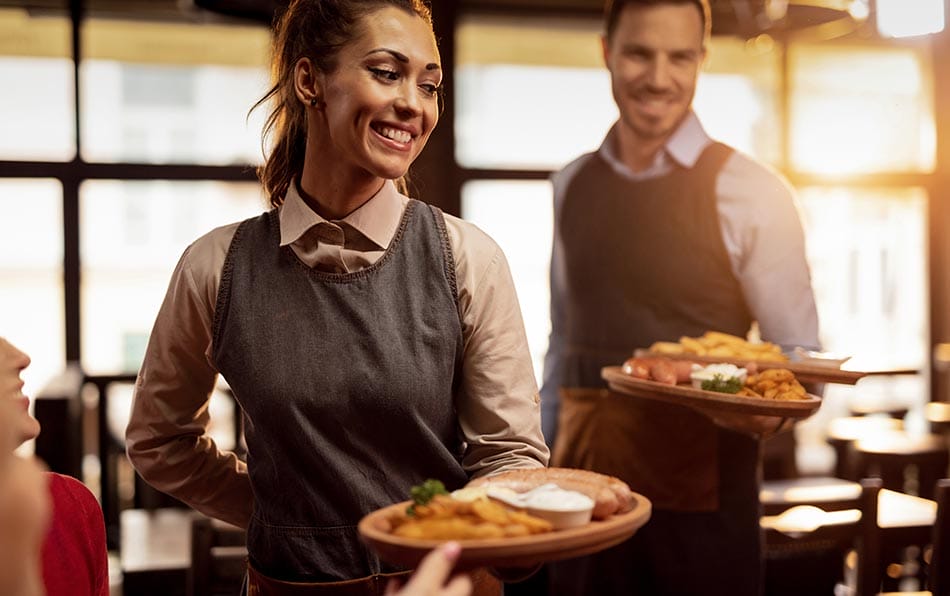To understand how to become a waiter, begin by gaining experience in entry-level roles, such as a host or busser, to develop essential skills. Familiarise yourself with the menu, customer service techniques, and food safety practices, and consider completing relevant training courses. With hands-on experience and a strong work ethic, you can progress and thrive in the hospitality industry. This guide will show you how to become a waiter, the qualifications needed, and the essential skills for success.
What Are the Different Types of Waiters?
Waiters play a crucial role in the hospitality industry, providing excellent customer service and ensuring dining experiences are enjoyable. Depending on the type of establishment and the level of service offered, there are several main types of waiters:
- Fine Dining Waiters: These waiters work in more upscale restaurants where food and service are of a higher standard. In fine dining, they are expected to know all the details of the menu, the wine list, and the appropriate behaviour at the dining table.
- Casual Dining Waiters: These waiters work in more casual restaurants such as cafés or family-style establishments. The service provided by casual dining waiters tends to be friendly, but they may not have the extensive training expected of fine dining waiters.
- Bar Waiters: These waiters serve customers at bars that are often extensions of restaurants. Most bars have a good selection of cocktails, wines, and beers, which bar waiters must be familiar with. Bar waiters may also handle food service for customers.
- Café Waiters: These waiters work in cafés or coffee shops, offering table service and sometimes counter service. Most café waiters focus on serving coffee and light meals, offering a more casual style of service.
- Banquet Servers: These waiters host events such as weddings, conferences, or parties. A banquet server works as part of a team to serve food and drinks in bulk to several guests at once.
- Room Service Waiters: These waiters work in hotels and deliver food and beverages to guests in their rooms. As guests should not be disturbed, room service waiters must perform their duties efficiently and ensure the privacy of the guests.
- Food Runners: Although not officially designated as waiters, food runners are an integral part of restaurant operations. They move food from the kitchen to the dining area, ensuring orders are delivered promptly and efficiently, and they may also assist with supplying cutlery and other items.
What Does a Waiter Do?
Waiters are responsible for ensuring that customers have a pleasant dining experience. Their duties can vary based on the type of establishment, but here’s an overview of the main responsibilities of a waiter:

- Greeting Customers: Waiters greet guests warmly as they arrive, making them feel welcome and valued. They guide customers to their assigned tables and hand out menus, ensuring they are comfortable. A friendly and professional first impression is crucial to setting the tone for the dining experience. Providing a warm attitude helps guests feel at ease and enhances their overall visit.
- Taking Orders: Once guests are ready, waiters take note of their food and drink orders. They must listen carefully to any special requests, preferences, or dietary restrictions, and confirm details such as allergies. Ensuring accuracy is key, as this prevents mistakes in the kitchen and guarantees the guests’ satisfaction. Effective communication with the customer is essential for a smooth service.
- Serving Food and Drinks: Waiters deliver the food and drinks ordered, making sure each item is served correctly and in a timely manner. They ensure that the right dishes are brought to the right guests and serve them with care and attention. Throughout the meal, they may also offer to refill drinks or bring additional items, always anticipating the needs of the guests. Providing attentive and efficient service helps maintain a positive dining experience.
- Providing Recommendations: Waiters should have a strong knowledge of the menu, including ingredients, cooking methods, and any daily specials. This allows them to offer helpful suggestions based on customers’ preferences and dietary needs. They should be able to answer any questions regarding the dishes and wine pairings with confidence. Offering personalised recommendations enhances the guest experience and demonstrates expertise.
- Checking on Guests: Throughout the meal, waiters check on their tables to ensure guests are enjoying their meals and are satisfied with the service. They ask if customers need anything else, such as additional condiments or drink refills. Being attentive without being intrusive is essential in creating a comfortable and enjoyable environment. If any issues arise, they must handle them promptly and professionally.
- Handling Payments: At the end of the meal, the waiter brings the bill to the table and processes the payment. They must ensure that all charges are accurate and clearly explained to the guest, whether by cash, card, or digital payment. Waiters should thank the guests and provide a positive farewell to encourage return visits. Handling payments efficiently helps maintain a smooth and professional experience.
- Maintaining Cleanliness: Waiters are responsible for keeping their assigned section clean and organised. This includes clearing away dishes promptly, wiping down tables, and resetting them for new guests. They also ensure that utensils, glasses, and napkins are properly stocked and in good condition. A clean, well-maintained dining area contributes to a positive atmosphere and guest satisfaction.
- Collaborating with Kitchen Staff: Effective communication between waiters and kitchen staff is vital for smooth service. Waiters relay customers’ orders to the kitchen, ensuring accuracy and timeliness. They must also pass along special requests or modifications to dishes, such as dietary restrictions or preferences. Good teamwork ensures that meals are prepared correctly and delivered to guests without delay.
Waiters are an essential part of the dining experience, directly influencing customer satisfaction and the overall success of the restaurant.
Average Waiter Salary
Salaries for waiters can vary significantly based on factors such as location, type of establishment, and experience. Here’s an overview of typical earnings for waiters in the UK:
- Entry-Level Waiters: Starting waiters typically earn between £18,000 and £22,000 per year, including base salary and taxes. Additionally, tips can significantly increase total earnings. In many restaurants and cafes, tips contribute substantially to overall income.
- Experienced Waiters: After working for several years (typically 2–5 years or more), waiters can earn between £22,000 and £30,000 annually, especially in busy, high-demand restaurants where tips are larger.
- Fine Dining Waiters: Working in a fine dining establishment, waiters can earn a starting salary from £30,000, potentially rising to £40,000 or more. Tips often make up a substantial portion of their earnings.
- Special Events and Banquet Servers: Waiters at events or in banquet-themed restaurants often earn different wages depending on the number of events worked and the total hours put in. However, these roles can be quite competitive, particularly during peak seasons when tips can be higher.
Essential Skills of a Waiter
To become a successful waiter, you must possess good interpersonal skills, be organised, and have excellent customer service skills. The following are vital skills required to be a waiter:

- Excellent Communication Skills: Communication is essential when taking orders and speaking with kitchen staff. Clear communication ensures that customers’ needs are met and prevents mistakes. You must also listen attentively to customer requests. This builds trust and creates a positive dining experience.
- Strong Customer Service Skills: Waiters must provide outstanding service to ensure a pleasant dining experience. Being attentive, polite, and respectful to customers is key to making them feel valued. Every interaction, from greeting to farewell, should reflect excellent service. This helps build customer loyalty and satisfaction.
- Multitasking Abilities: A waiter often has to juggle multiple tables and tasks at once. Handling orders, serving food, and managing customer queries requires focus and efficiency. Even during quieter shifts, there’s always something to do. Good multitasking helps ensure that service remains smooth and timely.
- Attention to Detail: Small details can make a big difference in customer satisfaction. Remembering special requests, dietary needs, or preferences shows care and professionalism. Accuracy in order taking and delivery is vital. The more precise you are, the more likely customers will have a positive experience.
- Knowledge of Food and Beverage: A thorough understanding of the menu is essential for providing the best recommendations. Being able to inform customers about ingredients, specials, or items that are out of stock is important. It also helps build your credibility and trust with customers. Knowledgeable waiters enhance the overall dining experience.
- Problem-Solving Skills: Customers can present challenges that need quick and calm solutions. Whether it’s a wrong order or an unhappy guest, resolving issues with professionalism is key. Remaining composed, without escalating the situation, helps maintain a positive atmosphere. Problem-solving is a crucial skill to handle difficult situations effectively.
- Physical Stamina: Waiters need physical endurance to keep up with the demands of the job. You’ll spend long hours on your feet, often carrying heavy trays and walking quickly between tables. The ability to stay energetic and focused throughout the shift is essential. Physical stamina helps maintain a high level of service during busy periods.
Waiter Tips
Here are some essential tips for becoming a successful waiter:
- Gain Experience: Start with entry-level roles that teach you the basics of the industry. Every shift will build your confidence and develop the skills needed to excel. The more experience you gain, the more exceptional you will become.
- Remember the Menu: Take the time to learn the menu thoroughly—understand the components, preparation methods, and any daily specials. Knowing the menu inside and out will help you provide better recommendations and answer customer questions with ease.
- Enhance Communication: Work on your communication skills by engaging with customers, addressing their concerns, and speaking in a polite and respectful manner. Effective communication fosters trust and creates a positive dining experience for guests.
- Be Systematic: Keep track of tables, orders, and additional tasks with a methodical approach. Use a notebook or electronic device to stay organised during busy shifts. A systematic approach will help you manage your workload and ensure nothing is overlooked.
- Work on Self-Motivation: Customers appreciate having a friendly and helpful person serving them. Even during busy or challenging shifts, it’s important to stay positive, act professionally, and keep a smile on your face. Self-motivation helps maintain high service standards.
- Be Prepared: The restaurant industry can be unpredictable, with busy periods followed by lulls. Having the right attitude and staying adaptable will help you succeed in this fast-paced, ever-changing environment.
- Build with the Team: Strong relationships with your colleagues can be invaluable. Helping each other, whether it’s cleaning, prepping for busy shifts, or collaborating during service, enhances the overall efficiency and quality of service. Teamwork leads to smoother operations and better service for customers.
Waiter Requirements
Being a waiter is not as easy as it sounds. There are specific skills and training that applicants need to bring to the table. Here is a brief guide to what is required to start a career as a waiter:

- Educational Background: While most employers may not ask for formal qualifications, having a high school diploma or equivalent can be beneficial. Some establishments also offer on-the-job training to help you get started.
- Food Service Experience: Although professional qualifications are important, many restaurants provide training for new waiters. Previous experience in food service can be an advantage, but many establishments are happy to train applicants with the right attitude.
- Basic Food Hygiene Certificate: Understanding safe food handling practices is often a requirement for employment in the UK. A food hygiene training certificate is usually mandatory to ensure compliance with health and safety regulations.
How to Become a Waiter
There’s a simple process to follow if you want to become a waiter:

- Get Necessary Experience: Start by applying for part-time or entry-level jobs in restaurants, bars, or cafés. This will allow you to learn the fundamentals of the job and refine your skills along the way.
- Understand Food & Beverages: Familiarise yourself with food service, including the items on the menu, drink pairings, and the style of cuisine. This knowledge will help you serve customers more efficiently and confidently.
- Look into Training Programmes: If possible, seek out training programmes or courses related to food safety and customer service. These programmes are valuable as they broaden your skill set and make you a more attractive candidate to employers.
- Take Food Hygiene Courses: If required by the employer, complete a food hygiene and safety course. Understanding safe food handling practices is often essential for employment in the UK hospitality sector.
- Apply for Waiter Positions: Once you have gained the necessary experience and skills, start applying for waiter positions at hotels, restaurants, cafés, or bars. Add relevant experience to your CV, particularly if you’ve worked in similar roles before.
- Prepare for Interviews: If you’re called for an interview, be ready to discuss your customer service skills and previous service experience. Familiarise yourself with common interview questions for waitstaff roles and refine your responses.
- Develop Your Skills: As you gain experience, continue to develop your skills by working at different establishments. This will deepen your understanding of the industry and improve your abilities as a waiter.
- Build a Network: Connect with other waiters and professionals in the hospitality industry. Networking can open doors to new job opportunities and provide valuable insights into the market.
Get Qualified as a Waiter
Online Waiter Training, Essential Waiter Training, Certified Waiter Program, Professional Waiter Diploma
Frequently Asked Questions
Why Should You Be a Waiter?
Becoming a waiter or waitress offers opportunities in a revenue-driven industry and helps build positive customer relationships in a competitive market. One reason to take on this role is the chance to work dynamically while being on your feet, as customer service requires a high level of attention. If you’re looking to develop interpersonal skills and pursue a career in hospitality, this could be the perfect role for you.
Is Being a Waiter the Right Choice for You?
If you enjoy working in lively environments and have a sociable, talkative personality, being a waiter could suit you well. This job is ideal for team players who are eager to learn about food and beverages and are committed to providing excellent customer service.
How Much Do Waiters Earn on Average?
Salaries for first-year waiters typically start at around £22,000 to £30,000, including tips and additional bonuses. With more experience and the opportunity to work in higher-end establishments, a waiter’s salary can increase to between £26,000 and £30,000, often boosted by tips. In busy or high-end restaurants, waiters can earn upwards of £26,000, with the potential to reach £30,000 or more, depending on the tips and additional gratuities.
What Certificates Are Looked For in a Waiting Job?
In formal settings, having certificates isn’t strictly necessary, but holding a G.E.D. (General Education Diploma) or high school equivalency diploma can certainly be advantageous. Completing a food hygiene certification and a customer service course will also enhance your skills and qualifications, making you a more competitive candidate in the long term.
Do I Need to Possess Certain Skills to Start?
Previous experience isn’t always required, as many restaurants hire entry-level waiters and provide the necessary training. Starting in roles such as a host or busser can provide valuable experience and make your transition to waiting tables smoother.
What Are the Job Prospects for a Waiter?
Job prospects for waiters are generally promising, especially as the hospitality sector continues to grow. With the demand for lunch and dinner services, waiters will always be needed in restaurants, cafés, and other food-serving establishments. Additionally, those who excel in their roles often have opportunities for promotion, such as moving into supervisory or management positions.
Who Is a Waiter at a Restaurant? Waiter Hierarchy and Progressing Within the Role
Waiters progress from entry-level positions to higher ranks, such as head waiter or supervisor. Experienced waiters can advance further, sometimes managing entire cafés or restaurants. There are also specialisation opportunities in areas like wine service or event planning, depending on the establishment.
Waiter Exit Options and Opportunities
For experienced waiters, there are various career options beyond the role itself. With their experience, many move into hospitality management, catering, or event planning. Some may decide to open their own restaurants or cafés, while others might transition into food and beverage consulting or even the culinary arts.


